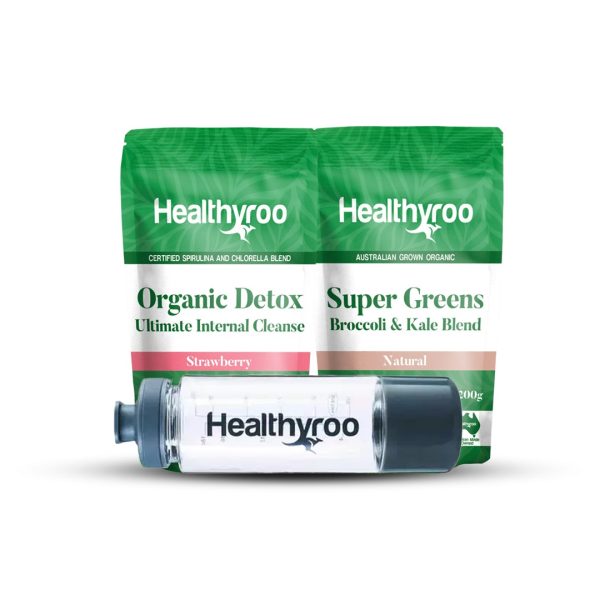Sweetener Stevia Doesn’t Alter Gut Microbiome
Non-nutritive sweeteners, especially stevia, are often considered healthier sugar substitutes. However, despite stevia’s centuries-long use in South America, its impact on the gut microbiome is still being examined.

Table of Contents
A new comprehensive study has emerged – recently published in Nutrients, providing empirical data on the impact of stevia on the gut microbiota composition. The research, employing rigorous study design and state-of-the-art analytic techniques, offers a nuanced perspective on the influence of long-term stevia consumption.
As the scientific community continues to unravel the complexities of dietary components and their interactions with the gut ecosystem, this study serves as a pivotal reference point. It prompts a reconsideration of previous assumptions about stevia and gut health, setting the stage for a deeper exploration of how this sweetener may integrate into our dietary framework without disrupting the delicate balance of our internal microbial communities.
Key Takeaways
- Studies have shown that non-nutritive sweeteners (NNSs) can have different impacts on host metabolism mediated by gut microbiota.
- Stevia, a popular NNS, has been found to have a prominent impact on fatty acid biosynthesis.
- Consumption of stevia does not significantly alter the overall composition of gut microbiota, but it does impact microbiota function.
- Long-term consumption of stevia is unlikely to have a significant impact on the human gut microbiota.
Background on Sweeteners
Sweeteners, from natural sugars to non-nutritive synthetic options, have been crucial in the food industry, including the protein powder sector, where they meet the human craving for sweetness without extra calories. Notably, plant-based protein powders globally, such as our own Healthyroo products, utilise stevia to improve flavour, merging taste enhancement with calorie-conscious choices.

Stevia, a zero-calorie sweetener derived from the leaves of the Stevia rebaudiana plant, has been extensively studied for its potential benefits. Research suggests that stevia’s impact on metabolism could be minimal, making it a suitable option for weight management.
Moreover, investigations into stevia’s effects on gut health indicate that it does not significantly alter the gut microbiota composition. This finding is crucial for individuals seeking liberation from added sugars and artificial sweeteners, aiming to maintain a balanced diet that supports a healthy metabolism and gut ecosystem.
Study Participants and Design
In a 12-week study, researchers examined how daily stevia use affects the gut health of 28 young adults, compared to those who made no changes to their diet. By analyzing the participants’ gut bacteria through 16S rRNA sequencing, the study aimed to understand the impact of stevia, a non-nutritive sweetener, on the diversity and composition of the gut microbiota.
The recruitment process was meticulously designed to encompass a broad range of study participant demographics, thereby allowing for the extrapolation of the results to the general population. Candidates were screened to meet specific health criteria, ensuring the study’s findings would not be confounded by pre-existing conditions.

This strategic approach to participant selection and group allocation underpins the strength of the evidence, reinforcing the study’s potential to inform future dietary guidelines and to empower individuals seeking to optimise their gut health through informed dietary choices.
Stevia Consumption Protocol
To investigate the specific effects of stevia on gut microbiota, participants in the study adhered to a strict protocol that involved the regular consumption of a predetermined amount of steviol glycosides. This stevia consumption duration was meticulously planned to provide adequate exposure while allowing for a thorough microbiota diversity assessment.
The precise quantity of steviol glycosides consumed was calibrated to reflect typical dietary usage, minimizing any potential confounding factors that could obscure the true relationship between stevia intake and gut microbiota composition.
Throughout the study, dietary intake was monitored and controlled to ensure consistency and reliability in the results, providing a robust framework for evaluating the long-term implications of stevia use on gut microbial communities.
Microbiota Analysis Overview
Analyzing gut microbiota involves complex procedures, often beginning with the collection of fecal samples which are then subjected to genomic sequencing to identify and quantify the various microbial species present. The methods used in such studies are central to the accuracy and relevance of the findings.
Methods Used:
- Genomic sequencing (e.g., 16S rRNA gene sequencing, metagenomic sequencing)
- Bioinformatics tools for data analysis
One must acknowledge the limitations of the study, which can include sample size, duration of the study, and the precision of the bioinformatics tools used. Variability in the human microbiome and external factors influencing it also pose challenges in drawing definitive conclusions.
Limitations of the Study:
- Potential biases in sample collection
- Inter-individual variability in microbiota composition
Stevia’s Impact on Microbiota
Regarding the effects of stevia on gut microbiota, recent research indicates that while stevia consumption can influence certain bacterial functions, it does not significantly change the overall composition of the gut microbiota in healthy adults. This finding alleviates concerns about potential health risks associated with the long-term effects of altering gut microbiota through dietary sweeteners.
The study’s rigorous analysis suggests that moderate consumption of stevia as a sweetener is unlikely to disrupt the delicate balance of the intestinal ecosystem. However, as with any dietary component, it is prudent for individuals to monitor their response to stevia and consult healthcare professionals regarding their unique nutritional needs to ensure a harmonious gut environment and overall well-being.
Microbiota’s Role in Wellness
The gut microbiota plays a crucial role in human wellness, influencing various aspects of health from nutrient absorption to immune system function. A diverse microbiota is associated with numerous gut health benefits, including enhanced protection against pathogens, improved metabolic outcomes, and a more robust immune response.
Studies show that a varied microbial population is vital for the fermentation of non-digestible fibres, production of short–chain fatty acids, and synthesis of certain vitamins. Maintaining microbiota diversity is thus critical for holistic health, and dietary choices play a significant role in shaping this complex ecosystem.
It is essential to recognise the interconnectedness of diet, microbiota composition, and overall well-being, advocating for informed choices that support a balanced and thriving gut environment.
Dietary Advice and Gut Balance
To maintain a balanced gut microbiota, dietary choices should include a variety of fibre-rich foods, probiotics, and prebiotics, all of which have been shown to positively influence the diversity and functionality of gut bacteria.
The effects of artificial sweeteners, particularly on gut health and nutrient absorption, are an ongoing area of research.
Fiber-Rich Foods
- Promote the growth of beneficial bacteria
- Aid in nutrient absorption and digestion
Probiotics and Prebiotics
- Probiotics: Live beneficial bacteria found in fermented foods
- Prebiotics: Non-digestible fibres that feed probiotics

New evidence suggests artificial sweeteners do not disturb gut flora balance, however, it’s wise not to binge on it.
Embrace Healthyroo’s gut-friendly nutrient-dense Super Greens and Organic Detox that liberate the gut’s potential for wellness, fostering a symbiotic relationship where both host and microbiota thrive.
Conclusion
This study provides robust evidence that the consumption of the non-nutritive sweetener stevia does not significantly alter the composition of the gut microbiota.
These findings have important implications for dietary recommendations, as they suggest that stevia can be safely included in a health-conscious diet without adversely affecting gut microbial balance.
This research enhances our understanding of the interaction between diet and the gut microbiome, thereby informing nutritional strategies for maintaining optimal gut health.
Frequently Asked Questions about Stevia
Is stevia good or bad for you?
Stevia is generally considered safe and can be a healthier alternative to sugar, but individual reactions may vary.
Is Stevia a Safe Sweetener for Protein Powder?
When it comes to the untold truth about protein water, many people wonder if stevia is a safe sweetener. The answer is yes. Stevia is a natural, zero-calorie sweetener that is safe for consumption. It is a great option for those looking to sweeten their protein water without adding extra calories.
Is Stevia the Best Gut Health Sweetener?
The recent study published in Nutrients investigated the effects of stevia, a non-nutritive sweetener, on human gut microbiota over 12 weeks. The findings suggest that regular consumption of stevia does not significantly alter the composition of the gut microbiota. This includes no significant changes in alpha and beta diversity, similar taxa abundance between control and stevia groups, and no large-scale changes in the gut microbiota. Therefore, based on this study, stevia may not be the best or worst sweetener for gut health as it appears to have a neutral impact.
Why I stopped using stevia?
Personal reasons for stopping stevia use could include taste preferences, digestive issues, or personal health considerations.
What is the healthiest sugar substitute?
The healthiest sugar substitute varies by individual need, but options like stevia, erythritol, and monk fruit are popular for their natural origins and lower calorie content.
What chemical is in stevia?
Stevia contains steviol glycosides, which are sweet compounds extracted from the leaves of the Stevia rebaudiana plant.
Does stevia alter gut microbiome?
Some studies suggest that stevia extracts can affect the composition of the gut microbiota, leading to microbial imbalance and disrupting communication between bacteria in the gut. However, a recent study published in Nutrients confirms that stevia does not alter gut microbiota composition.
What sweetener does not affect gut bacteria?
Erythritol is a sugar alcohol that has minimal effects on gut bacteria and blood sugar levels.
What is the effect of stevia on the gut microbiota and glucose tolerance in a murine model of diet induced obesity?
In murine models, stevia has been shown to potentially improve glucose tolerance and alter the gut microbiota, but effects may vary, however the most recent study indicates that stevia doesn’t alter gut microbiome composition.
Can you have stevia with leaky gut?
Stevia is generally considered safe, but individuals with leaky gut should consult a healthcare provider, as effects can vary based on individual health conditions.
Citations:
[1] https://www.ncbi.nlm.nih.gov/pmc/articles/PMC6363527/
[2] https://www.ncbi.nlm.nih.gov/pmc/articles/PMC9028423/
[4] https://hardydiagnostics.com/blog/can-stevia-affect-your-microbiome
[5] https://tellus.ars.usda.gov/stories/articles/natural-sweetener-stevia-makes-a-gutsy-comeback

